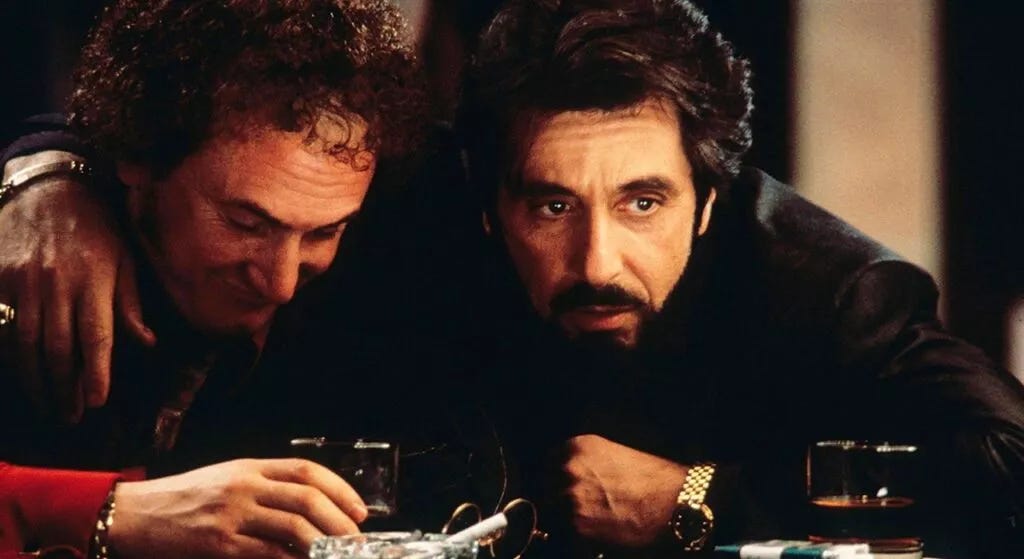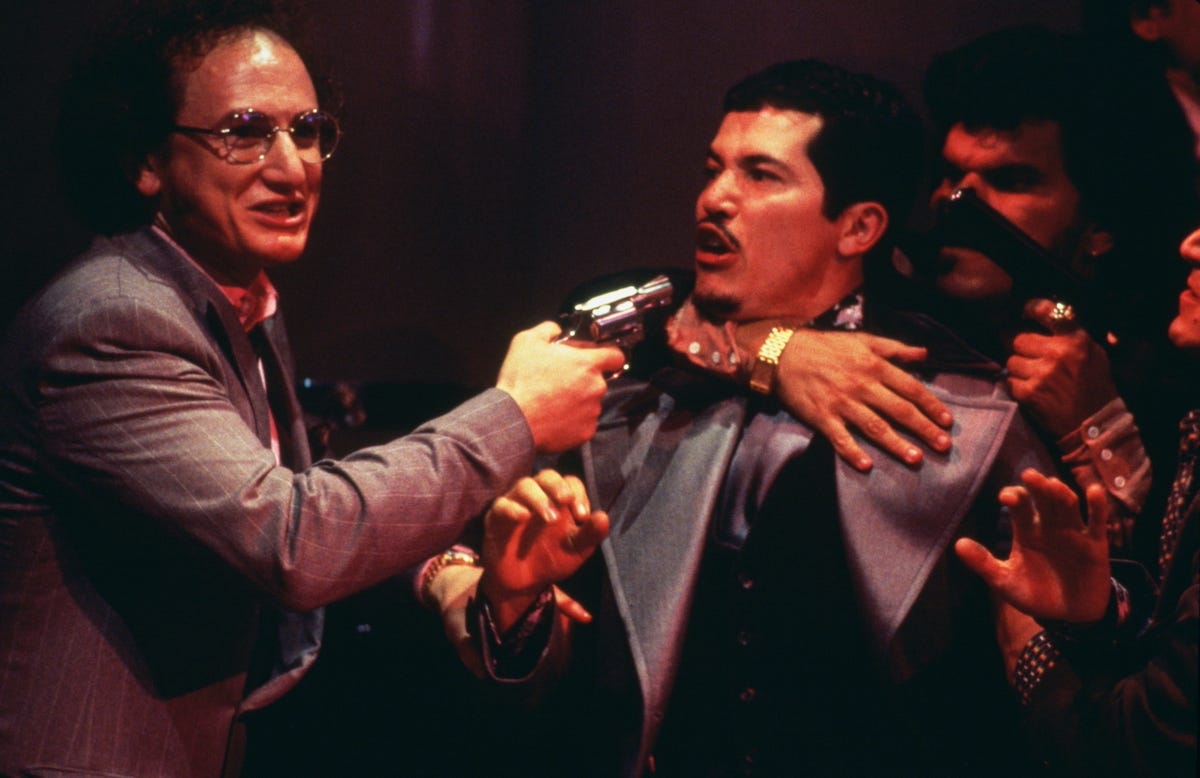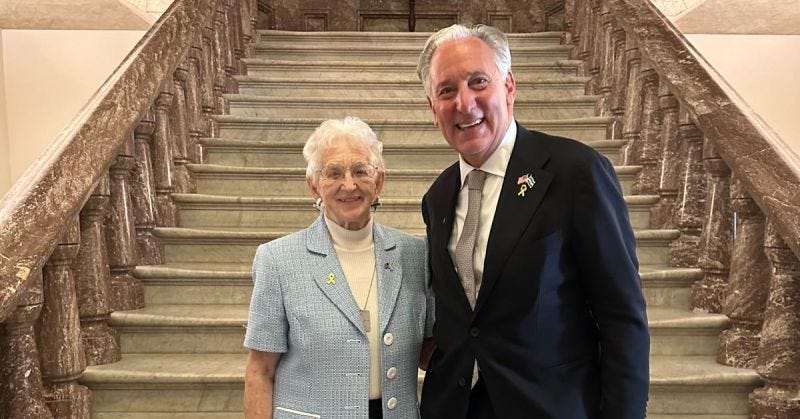I’m in my Al Pacino era.
And by that, I don’t mean I’m staggeringly handsome, extraordinarily talented, or quietly charismatic (though I’m a little bit of all three). I’ve just been watching a hell of a lot of Al Pacino lately. Everyone has seen The Godfather, The Godfather II, and Scarface. I’ve seen them all multiple times. But until recently, I had never seen Heat. So I decided to give it a watch.
I can’t say I loved Heat, but I understood it. And it didn’t stop me from digging deeper into the Pacino crates and watching Serpico and Sea of Love. Both were interesting, but neither were a slam dunk. The Pacino character in each film reminded me a bit of a performance I had seen before, albeit years ago: his turn as the titular star of Carlito’s Way. It had been decades since I watched the Brian de Palma crime drama, so I revisited it as the final installment of my recent Pacinofest.
Pacino is beautiful in this feature, and Luis Guzmán and John Leguizamo both sizzle in early roles. But an absolutely crazed Sean Penn steals the show. Indeed, what makes this movie memorable is the narrative choice to make it Penn’s film. Our Carlito is an uncomplicated, reliable protagonist and narrator, whereas Penn’s Kleinfeld—a corrupt, gangsterfied attorney—becomes the deeply flawed and ultimately villainous centerpiece of the story.
In terms of acting, it feels as if Sean Penn was born for this role. If the stoned out, unserious Jeff Spicoli from 1982’s Fast Times at Ridgemont High perfectly channels the young SoCal surfer’s generational energy, then the coked out, crooked David Kleinfeld from 1993’s Carlito’s Way perfectly encapsulates the malicious, all-consuming greed of the decade that followed.
From the opening credits, we know that Carlito is doomed. The only question is how, and by who. In the end, Benny Blanco from the Bronx famously murders Carlito out of cold vengeance as dictated by the law of streets. But Kleinfeld—through his schemes, by his betrayal, and in his unmitigated ambition—puts Carlito on the inescapable path of violent action and fatal reaction. Kleinfeld is Carlito’s closest friend and ally, a relationship he abuses with absolutely no regard for Carlito’s safety or wellbeing.
This film is special because it is so strange, chilling, and challenging to convention: Kleinfeld is no antihero, he is a genuinely irredeemable villain driving the story through each escalatory scene. If Penn wasn’t so magnetic in the role, Pacino’s understated presence opposite him would feel like a waste. But it works like a charm.
Since I finished Carlito’s Way a few weeks ago, these characters and their demented world have resonated deep in my spirit and my psyche. Over the last few days, however, the Kleinfeld/Carlito dynamic has crystallized into a searing metaphor of geopolitical proportions: The United States is Carlito and Israel has emerged as our Kleinfeld.
Before you look askance at this metaphor, rest assured that it has nothing to do with Kleinfeld’s Jewishness. This isn’t about Israel as a Jewish state per se, just as Kleinfeld’s treacherous moves have nothing to do with his religious identity. These are simply a fictional character and a real world nuclear power who both happen to have abused the loyalty of their closest friends as they descend fully into personal hell and unwinnable conflict.
Between its genocide in Gaza and its expansive regional belligerence, Israel has become the closest historical successor to Nazi Germany.
Between its globally streamed genocide in Gaza and its expansive regional belligerence, in 2025 Israel has become the closest historical successor to Nazi Germany. Like Kleinfeld's schemes, every Israeli escalation drags us deeper into conflicts we never chose—witness this week's war with Iran, initiated in full contravention of our interests and our demands. Carlito was destined to die for Kleinfeld's sins because he felt he owed his attorney his life. But the U.S. is loyal, not suicidal.
They are our Kleinfeld, but unlike Carlito, the United States will not go down with Israel. Once upon a time, American and Israeli interests could have been seen as largely aligned. They have diverged dramatically in recent years, and today they are diametrically opposed. The American people know this, and they’re not going back to the old perspective on the U.S.-Israel relationship. Rogue states are only allowed to survive so long as powerful backers prevent them from suffering the full consequences of their actions.
We won't walk away because it's right, although lord knows the moral justifications will come out in full force when it happens. We'll do it because it's in our interest. It is only a matter of time: The U.S. will get sober, get smart, and walk away.
ICYMI, check out these related posts:
Good Listening: I Fought in a War
I don’t want to fight in a war. Not abroad, not anywhere. I would be one of those guys who fires off a gun and falls on his ass, gets injured and is sent far away from the front lines.
🚨EXCLUSIVE🚨 Internal Jewish Community Relations Memo Defends Trump, Alleges Due Process
I don’t usually do this kind of thing. I’m not a journalist.
Breaking: Israel's Human Shields
Taking a single life obliterates an entire universe; it is evil beyond comprehension.









I am also a big Pacino fan. He was my first movie “crush.” And he’s indisputably one of our best actors. I’m going to have to watch “Carlito’s Way” again, maybe 10-15 years after I last saw it to evaluate how correct your conclusions are. But I’ll definitely enjoy looking at young Al again! So thanks!
Interesting comparison Evan. Ever since I read Craig Unger's book "House of Trump, House of Putin" ~8-10 years ago, it has been my opinion that both Trump & Putin had "Mob Boss" ambitions. Our POTUS was just ~15-20 yrs behind the Russian mob boss. It took a world war to get rid of the Nazis mob govt. The big question is whether we can fry our mob boss before we get marshall law declaration